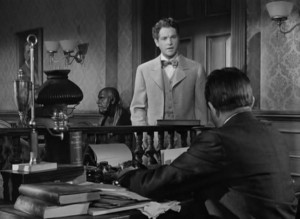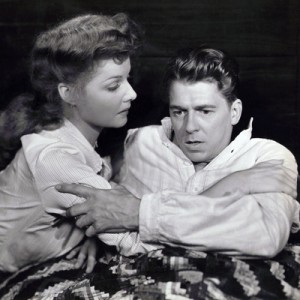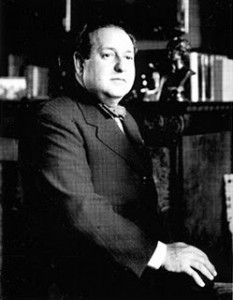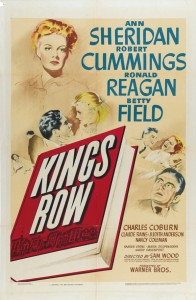The town they talk of in whispers.
Kings Row, forever identified as a precursor of Peyton Place fifteen years later, is based on Henry Bellamann’s 1940 novel about a fictitious Midwestern town circa 1900, filled with insanity, suicide, fornication, euthanasia, miscegenation, incest, even homosexuality. No, that story couldn’t be transferred to the cinema as is, not in 1942! Surprisingly, screenwriter Casey Robinson was able to preserve, in some fashion, all but the last three. The movie, superior to Peyton Place, would join the list of outstanding Warner Bros. films in 1942—Yankee Doodle Dandy, Now, Voyager, Across the Pacific and Gentleman Jim—though an admitted production drop, in quantity and quality, from the year before.
My previous “best viewing” of Kings Row was on a black and white, twenty-two-inch analogue TV. True, the movie is in black and white, but, now, this “last” viewing—on a pristinely restored DVD—was like seeing it for the first time. Along with a new appreciation of its positive qualities came not only a reminder of some already detected negatives, but, thanks to that new clarity, a few shortcomings I hadn’t noticed before, for one, that the opening scene in the school yard is an obvious set.
Kings Row was released four months after Pearl Harbor, although it had been filmed and edited by mid-October, 1941, with only Erich Wolfgang Korngold to add the music. Its plot and themes do not touch on war, but many of the minor supporting players were émigrés from Austria and Germany, fleeing the Nazis: Ilka Gruning, Ludwig Stossel, Erwin Kalser, Ludwig Hardt and Hermine Sterler, most of whom returned to Europe after the war.
War films had been released earlier in the decade, but the crop for 1942, America’s first full year of war, increased significantly with Wake Island, The Pied Piper, The Invaders, This Above All, Yankee Doodle Dandy, Captains of the Clouds and the Best Picture Oscar winner, M-G-M’s Mrs. Miniver. War pervaded the awards ceremony, March 4, 1943, for the previous year’s movies. The usual bronze, gold-plated Oscar statuettes were made of plaster. Alan Ladd and Tyrone Power unfurled a flag with the list of more than 27,000 names of industry personnel who were in uniform, and M.C. Bob Hope read a message from President Franklin Roosevelt; in 1941, during ceremonies for the best films of 1940, F.D.R. had delivered a six-minute direct-line address from the White House.
Even by Hollywood standards, Kings Row had more than the usual problems, the censorship aside—the casting of at least three of the major players, filming that went twice as long as scheduled and almost a million dollars over budget. The studio was so doubtful of its product that they hyped the film as being much more salacious than it actually was. Warner Bros. should not have worried: the movie was critically acclaimed and more than a box office success.
 Tyrone Power was projected for the lead male role of Parris Mitchell, but at the last moment 20th Century-Fox denied his release. Instead, director Sam Wood vouched for Robert Cummings as able to handle the string of tragedies that inhabit the plot. Cummings was known for lighter fare, and he proved the weak link in the film. Though he looked younger than his 32 years (his character was in his early twenties), his open, happy face was a bit antithetic to the dramatic weight he was required to carry. And some of his lines, either awkward in themselves or poorly delivered, didn’t help. To his grandmother, Madame von Eln (Maria Ouspenskaya): “I’m crazy about you, lady.” To lawyer Colonel Skeffington (Harry Davenport) when talking about a professorship in Vienna: “ . . . an invaluable opportunity.” To Drake McHugh (Ronald Reagan) about the possibility that his legs had been amputated unnecessarily: “The caverns of the human mind are full of strange shadows.”
Tyrone Power was projected for the lead male role of Parris Mitchell, but at the last moment 20th Century-Fox denied his release. Instead, director Sam Wood vouched for Robert Cummings as able to handle the string of tragedies that inhabit the plot. Cummings was known for lighter fare, and he proved the weak link in the film. Though he looked younger than his 32 years (his character was in his early twenties), his open, happy face was a bit antithetic to the dramatic weight he was required to carry. And some of his lines, either awkward in themselves or poorly delivered, didn’t help. To his grandmother, Madame von Eln (Maria Ouspenskaya): “I’m crazy about you, lady.” To lawyer Colonel Skeffington (Harry Davenport) when talking about a professorship in Vienna: “ . . . an invaluable opportunity.” To Drake McHugh (Ronald Reagan) about the possibility that his legs had been amputated unnecessarily: “The caverns of the human mind are full of strange shadows.”
Filming proceeded for two months without a Cassandra (Cassie) Tower. Olivia de Havilland, Bette Davis, Laraine Day and Geraldine Fitzgerald were among those who wanted the role or were considered. For various reasons—studios denying a release or filming conflicts—all came to nothing. In the end it was Betty Field. Hers is one of the highlight performances in the film, and she would appear fifteen years later in that “grown up” version of inappropriate goings-on in a small town, Peyton Place, when censorship was less a problem than in Kings Row.
 It’s always been said—and true—that Ronald Reagan has his best film role in Kings Row. When he awakens to discover a vindictive doctor (Charles Coburn) has cut off his legs, the line, “Where’s the rest of me?!,” became a tag line for the film—and the title of Reagan’s 1964 autobiography. In the film’s first half, which is more Cummings’ purview, Reagan deftly plays Drake McHugh, the light-hearted, frivolous guy about town, recalling similar roles in The Voice of the Turtle, The Girl from Jones Beach and the notorious Bedtime for Bonzo; in the latter part of the movie, more centered on Drake, he handles equally well the opposite end of the spectrum—the loss of his trust fund, unemployment, a serious relationship with Randy Monoghan and the accident. His multidimensional performance only accentuates Cummings’ boyish, one-note reaction to everything.
It’s always been said—and true—that Ronald Reagan has his best film role in Kings Row. When he awakens to discover a vindictive doctor (Charles Coburn) has cut off his legs, the line, “Where’s the rest of me?!,” became a tag line for the film—and the title of Reagan’s 1964 autobiography. In the film’s first half, which is more Cummings’ purview, Reagan deftly plays Drake McHugh, the light-hearted, frivolous guy about town, recalling similar roles in The Voice of the Turtle, The Girl from Jones Beach and the notorious Bedtime for Bonzo; in the latter part of the movie, more centered on Drake, he handles equally well the opposite end of the spectrum—the loss of his trust fund, unemployment, a serious relationship with Randy Monoghan and the accident. His multidimensional performance only accentuates Cummings’ boyish, one-note reaction to everything.
After Ginger Rogers had turned down the script, the role of Randy Monoghan went to Ann Sheridan, whose infectious smile and laugh were the brightest of the cast, a somewhat somber group, after all. Much like Cummings who was concurrently filming It Started with Eve at Universal, she had to shuffle between Kings Row and The Man Who Came to Dinner, also underway at Warners. Alternating between the level-headed Monoghan character and the superficial Lorraine Sheldon in Dinner was a hurdle Sheridan managed with ease.
Even death had a part in the final choice for the role of Dr. Tower. James Stephenson, who had made his mark in The Letter—a Supporting Actor nomination in 1940—suffered a heart attack, age 53, just before filming began. Claude Rains took the part and as always, even in the poorest of projects, he did an outstanding job, here as the likeable but troubled Dr. Tower: “Well, a little loneliness won’t hurt you to speak of . . . you get used to it.”
 And the “problem” with Korngold’s music materialized after Kings Row was filmed and released. The Oscar nominations for the year’s Best Score (for a dramatic or comedy picture) comprised an outrageous eighteen films. Some were deserving scores—Rózsa’s The Jungle Book, Newman’s The Black Swan and Steiner’s Now, Voyager, which won—and some were not so deserving. But, beyond belief and, more than that, a shameful injustice, Kings Row wasn’t nominated. Korngold’s score is one of his best, most similar, if similarities be drawn, to Anthony Adverse. The orchestration is weighed in favor of luscious strings, with florid harps and celesta, horns usually submerged in tuttis and few woodwind solos.
And the “problem” with Korngold’s music materialized after Kings Row was filmed and released. The Oscar nominations for the year’s Best Score (for a dramatic or comedy picture) comprised an outrageous eighteen films. Some were deserving scores—Rózsa’s The Jungle Book, Newman’s The Black Swan and Steiner’s Now, Voyager, which won—and some were not so deserving. But, beyond belief and, more than that, a shameful injustice, Kings Row wasn’t nominated. Korngold’s score is one of his best, most similar, if similarities be drawn, to Anthony Adverse. The orchestration is weighed in favor of luscious strings, with florid harps and celesta, horns usually submerged in tuttis and few woodwind solos.
The music forms an essential part of the film, not only throughout, but particularly in the opening scenes when Korngold sets the mood and assigns motifs for each of the characters. The composer, who had two children of his own and was in so many ways childlike himself, captures, in the first thirteen minutes, the innocence and demeanor of the five children whose adult lives would unfold in the remainder of the film. Parris (Scotty Beckett) and Cassie (Mary Thomas) swim in the pond, which probably displeased the censors but obviously passed. Parris visits his grandmother and begins his piano lesson. He attends Cassie’s birthday party instead of Louise Gordon’s (Joan Du Valle), held the same day. The party is poorly attended, an uneasiness reflected both in the music and in Dr. Tower’s distress as he watches Cassie flee crying into the house. Something is wrong.
